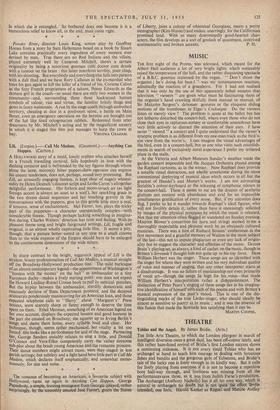Lili. (Empire.)—Call Me Madam. (Gaumont.)—Anything Can Happen. (Carlton.)
A HOLLYWOOD story of a timid, lonely orphan who attaches herself to a French travelling carnival, falls hopelessly in love with the dashing conjuror and is befriended by the toy figures through whom alone the lame, morosely bitter puppet-show operator can express his uneasy tenderness, does not, perhaps, sound very promising. But Li/I, an unusually engaging fantasy, is kept clear of sugary whimsi- cality by Helen Deutsch's discreet script and Leslie Caron's altogether delightful performance. Her forlorn and moon-struck air (as light foreign accent is always an asset to a waif), her sparkling grace in the two dream dance sequences and her touching gravity in the conversations with the puppets, give to this gentle little story a real, if tenuous, sense of enchantment. Mel Ferrer, too, plays the tricky Part of the puppeteer—a character unexpectedly complex—with considerable finesse. Though perhaps lacking something in imagina- tive daring, Charles Walters' direction has taste and feeling. With its pleasant theme song and bright fairground settings, Liii, fragile and Original, is an almost wholly captivating little film. It seems a pity, though, that a picture better suited in any case to a small cinema than to the wide expanse of the Empire should have to be enlarged to the cumbersome dimensions of the wide screen.
In sharp contrast to the bright, sugarstick appeal of Lill is the strident, brassy professionalism of Call Me Madam, a musical straight off the Broadway-Hollywood production line. The mild burlesque of an almost contemporary legend—the appointment of Washington's "hostess with the mostes' on the ball" as ambassador to a tiny European duchy—makes a lively starting point: one does not expect the Howard Lindsay-Russel Crouse book to pull its satirical punches. But the byplay between the ambassador, sturdily democratic and raucously derisive of State Department protocol, and the decayed aristocrats ponderously manoeuvring for an American loan, and those .repeated telephone calls to "Harry" about "Margaret's" Press notices, seem scarcely sharp or funny enough to deserve the time Spent on them. Ethel Merman, something of an American legend on her own account, displays the expected bounce and good humour in the part she created on Broadway; she squares up to Irving Berlin's songs and slams- them home, every syllable loud and clear. Her technique; though, seems rather mechanical, her vitality a bit too forced: this looks like a performance for and of the stage. Partnering her, George Sanders amiably relaxes to sing a little, and Donald O'Connor and Vera:-Ellen competently carry the 'rather tiresome sub-plot about the brash young American and the romantic princess. Their dance numbers might attract more, were they staged in less garish settings; but subtlety and a light hand have little part in Call Me Madam, which declares itself emphatically, and somewhat mono- tonously, for size and noise.
The romance of becoming an American, a favourite subject with Hollywood, turns up again in Anything Can Happen. George Papashvily, a simple, trusting immigrant from Georgia (played; rather surprisingly, by the smoothly assured Jose Ferrer), greets the Statue
of Liberty, joins a colony of whimsical Georgians,, meets a pretty stenographer (Kim Hunter) and makes, unerringly, for the Californian promised land. With so many determinedly good-hearted char- acters, the film develops as a sort of goulash of quaintness, contrived sentimentality and broken accents. P. H.


































 Previous page
Previous page